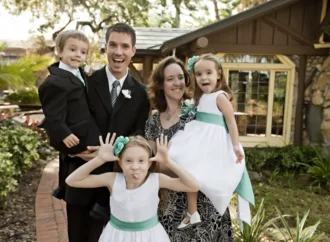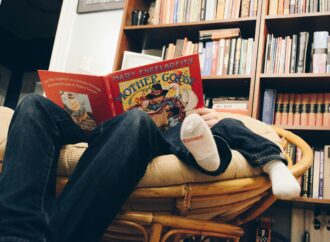Most Read from past 24 hours
Blog Template
- Home
- Blog Template

Why You Should Invite Children to Your Wedding0
- Family, Culture, Featured, MomThink, Western Civilization
- October 27, 2025
Two years ago, my wedding day went south when a young child pulled the fire alarm a couple hours into the reception, forcing everyone to evacuate as we waited for the fire station to turn it off. It was raining. My dress was soaked, my hair was ruined, and for a minute I thought my
READ MORE
Don’t Set Reading Goals. Build Reading Habits.2
- Featured, Culture, Education, Entertainment, Family, Literature, Western Civilization
- October 24, 2025
One of the most popular New Year’s resolutions—alongside “Lose weight” and “Improve relationships”—is “Read more.” Most people feel a moral burden to get through as many books as possible in a year. It’s drilled into us from a very early age that reading is associated with success in life, and successful people reinforce this idea
READ MORE
It’s Time to Rebuild America’s Shared National Identity0
- Culture, Featured, History, Politics, Western Civilization
- October 23, 2025
The other day, an amusing image showed up on social media featuring CBS television personality Gayle King sitting on an airplane next to Fox News television personality Jesse Watters. King posted the selfie on her Instagram page, reveling in the ironic, chance encounter with a rival journalist. Despite being on opposite sides of the political aisle, the
READ MORE

Living Under the Tyranny of the Casual3
- Culture, Featured, History, Religion, Western Civilization
- October 22, 2025
Look at any old photograph of people from a hundred years ago and one of the most striking things about it is how well dressed everyone was. Even men out laboring in the fields or fishing in rivers, their sleeves rolled up and foreheads slick with sweat, often wore button ups, sometimes even with a
READ MORE
Hanging Out With the Homesteaders0
- Culture, Education, Family, Featured, Uncategorized, Western Civilization
- October 21, 2025
Recently I attended the 2025 Homesteaders of America Conference in Virginia. Some 6,500 organizers, speakers, vendors, and attendees packed the fairground parking lots and a couple of acres of grass with cars and trucks, and blessed by a bright sun, had a grand time together. Here under tents were companies like Home Grown Collective, Egg Brigade Chicken
READ MORE
Selflessness Sets the ‘Soul on Fire’0
- Culture, Entertainment, Featured, Uncategorized
- October 20, 2025
Can America recover from the “loneliness epidemic” in which we increasingly find ourselves? We all know that although we’re more connected than ever, we strangely feel more isolated as well. Researchers regularly note the skyrocketing number of lonely people, in fact, one study from 2021 found that the number of Americans who say they have no close
READ MORE
Latest Posts
-

-

-

Reflections on Punctuation ... And Death
- Culture, Featured, Philosophy, Religion
- February 25, 2026
-

-

We're Being Shaped by Smut
- Culture, Entertainment, Family, Featured
- February 24, 2026


